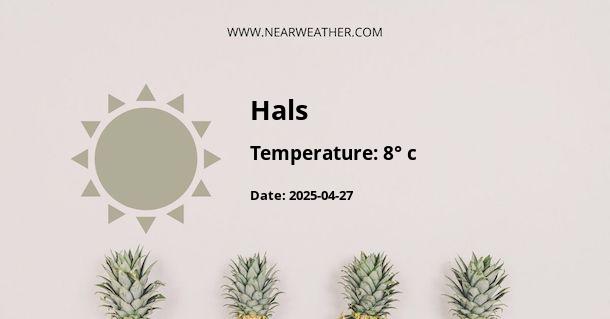Climate and Weather in Hals, Denmark
Hals is a picturesque town located in the Aalborg Municipality in the North Jutland region of Denmark. It is nestled on the eastern coast of the Limfjord, offering stunning views of the water and a charming small-town atmosphere. Understanding the climate and weather patterns of Hals is essential for residents, visitors, and anyone planning to explore this beautiful region. Let's delve into the climate of Hals and examine the weather conditions you can expect throughout the year.
Geographical Location and Influences
Hals is positioned at 56.9479° N latitude and 10.2736° E longitude, which places it in the temperate maritime climate zone. The town's location near the Limfjord and the North Sea significantly influences its weather patterns. The surrounding bodies of water help moderate temperatures and contribute to the region's relatively mild climate.
Temperature and Seasons
The temperature in Hals varies throughout the year, with distinct seasons. Summers in Hals are generally mild and pleasant, with average daytime temperatures ranging from 17 to 22°C (63 to 72°F). The warmest months are July and August, where temperatures can occasionally reach highs of around 25°C (77°F) or even higher.
Winters in Hals are cool, but not excessively cold. Average temperatures during the winter months, from December to February, range from 0 to 5°C (32 to 41°F). It is important to note that temperatures can drop below freezing, and snowfall is not uncommon during the winter season.
Spring and autumn in Hals bring mild temperatures and are characterized by pleasant weather conditions. During these transitional seasons, temperatures typically range from 7 to 15°C (45 to 59°F), making it an ideal time to explore the town and enjoy outdoor activities.
Precipitation and Rainfall
Hals experiences a moderate amount of precipitation throughout the year. The wettest months are generally July and August, coinciding with the summer season. During this time, Hals receives an average of 60 to 70 mm (2.4 to 2.8 inches) of rainfall per month.
Winter months, particularly November and December, also experience increased precipitation, primarily in the form of rain. The average monthly rainfall during these months is around 40 to 50 mm (1.6 to 2 inches). Snowfall is more common during the winter season, with an average of 5 to 10 snowy days per year in Hals.
Sunshine Hours
Hals enjoys a reasonable amount of sunshine throughout the year, with the highest number of sunshine hours occurring during the summer months. June, July, and August typically have the most sunshine, with an average of 8 to 9 hours per day.
In contrast, winter months, particularly December and January, have the lowest number of sunshine hours. During these months, Hals receives an average of 1 to 2 hours of sunshine per day.
Wind and Storms
Being located on the coast, Hals is susceptible to the influence of strong winds. The prevailing wind direction in the region is from the west, which can result in gusty conditions along the coastline. It is not uncommon for Hals to experience stormy weather, particularly during the autumn and winter months.
Climate Graph for Hals
Let's take a visual look at the climate patterns in Hals with the help of the following climate graph:

Conclusion
Hals, Denmark, offers a pleasant and mild climate throughout the year, with distinct seasons. Summers are enjoyable, with mild temperatures and average rainfall. Winters are cool but not excessively cold, with occasional snowfall. Spring and autumn are characterized by pleasant weather, making them ideal seasons for outdoor activities. Overall, Hals provides a delightful environment for residents and visitors to experience the beauty of Denmark's North Jutland region.
A - Hals's Latitude is 56.996090 & Longitude is 10.308070.
A - Weather in Hals is 6° today.
A - Climate Conditions in Hals shows clear sky today.
A - Humidity in Hals is 85% today.
A - Wind speed in Hals is 7.67 km/h, flowing at 126° wind direction. today.
